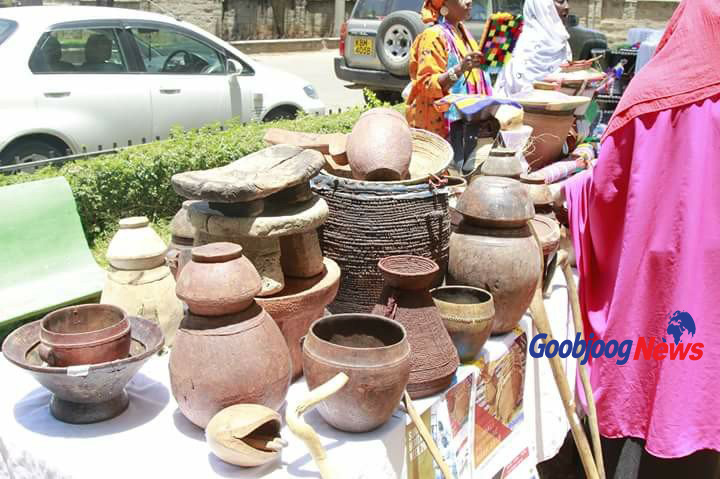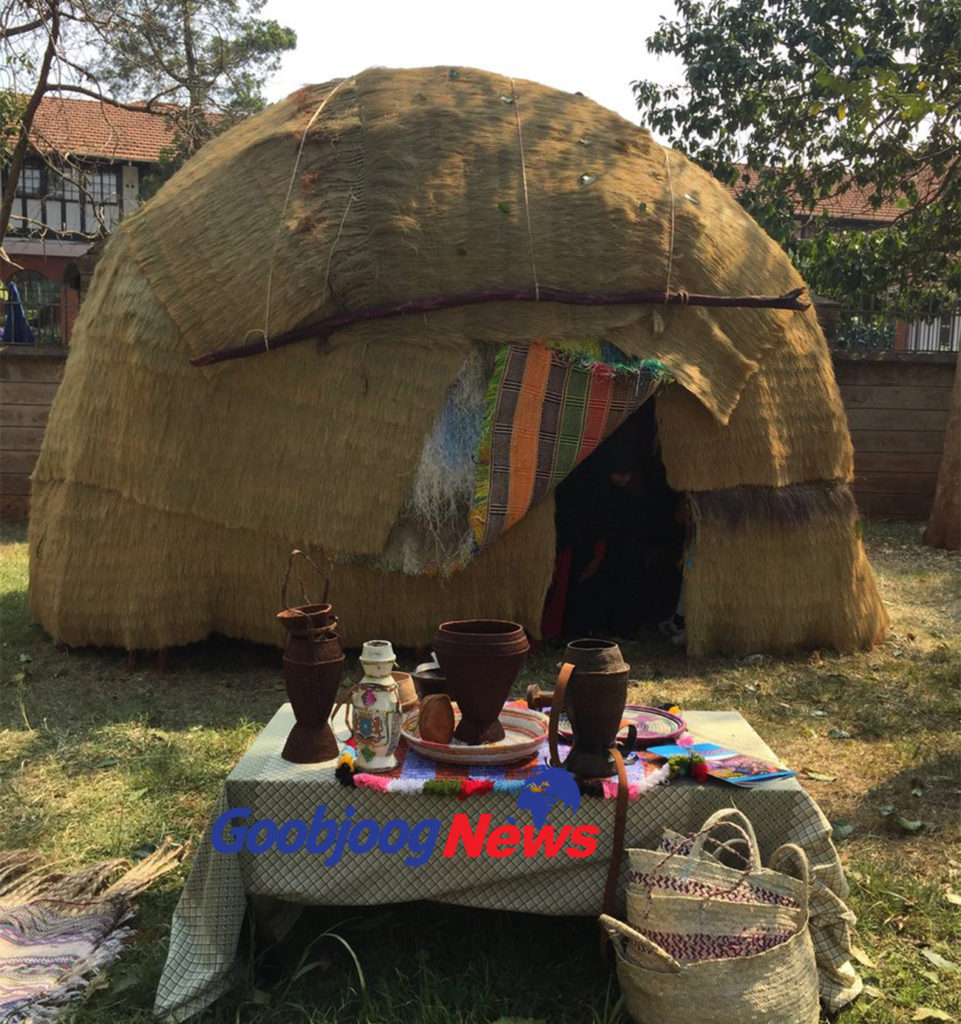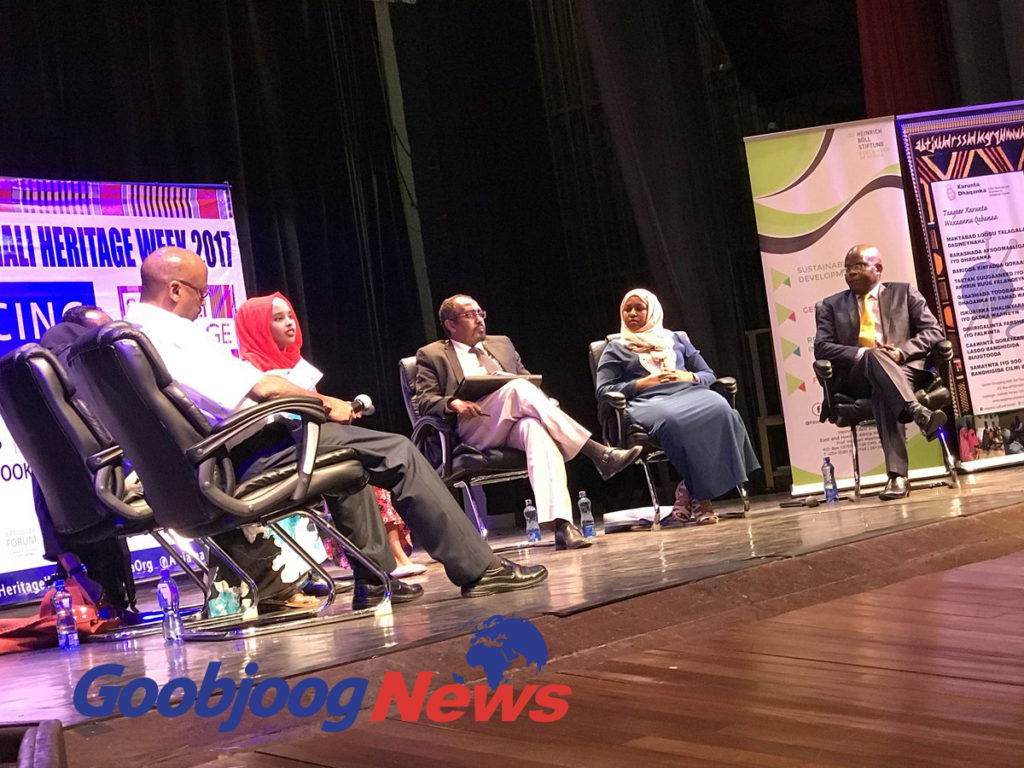Third annual Somali Heritage Week marked with pomp and glamour


By Fauxile Kibet
The 3rd Annual Somali Heritage Week that was concluded Sunday 8th October at the Kenya National Theatre in Nairobi brought the finest, the unique and best of Somali culture.
First launched in 2015, the event brings together prominent Somali professionals, business community, women, youth as well as politicians from the Somali community.
The event showcased the uniqueness in the Somali language, fashion, food, art, poetry, traditional song and dance as well as panel conversation on various issues that affect the community.
According to Awjama Omar Cultural Centre and Heinrich Boll Stifftung Foundation, the organizers, the event was created to give the Somali people a platform where they can come together to celebrate the community, discuss and deliberate on various challenges facing them and to sustain their cultural tradition while offering others from outside the community to appreciate their rich culture.

This year’s theme was “Enhancing Inclusivity” and meant to highlight the position of the Somali community within Kenya’s 43 tribes. Happening in the midst of a hotly contested presidential poll which normally divides Kenyans along tribal lines, the event sought to promote mutual coexistence among communities in the country.
Often, politics in the East African country are played along tribal lines with politicians keen to attain power mobilizing their communities to form the required numerical strength to triumph.
In 2007, Kenya was plunged into a civil strife after a disputed presidential election led to clashes between supporters of the two presidential candidates Former President Mwai Kibaki and the then Opposition leader Raila Odinga who had claimed his victory was stolen.
Mr. Odinga is currently engaged in another presidential election dispute with current president Uhuru Kenyatta after the country’s Supreme Court nullified Mr Kenyatta’s victory on 1st September.
In the spirit of enhancing a peaceful co-existence, organizers of this year’s event brought together different people from different cultures as well as panelists who deliberated the issues.
Police Harassment
Among the issues that came to the fore were the challenges facing the Somali community in Kenya, among them religious aspects and police harassment.
The Kenyan administration has often come under criticism over accusations of profiling the Somali community in its anti-terror activities often sparked by attacks within the country.
Following the tragic events at Kenya’s Garissa University on April 2015 where 147 students were killed by by Al-Shabaab militants, Kenyan authorities took steps that were seen by the international community as profiling the Somali community.
Kenya also threatened to close down the Daadab refugee complex which is home to thousands of Somali refugees but has since gone slow on the matter as repatriation continues.
Organizers of the events therefore also sought to offer solutions to Somali youth living in one of the country’s populous neighborhood of Eastleigh who often lack basic opportunities to help them improve their lives.

“The event among other issues is meant to discuss ways to empower and uplift Somali youth especially those living in places like Eastleigh which is congested and may not be conducive to empower youth to grow,” Fardousa Jama founder of Somali Heritage Week said.
The event brought together Somali professionals who formed a panel which discussed these issues before many youth who were in attendance. The youth were taught on how to tap into the Somali culture of hand crafts that can be sold in international markets.
The organizers showcased success stories such as that of the Alla-Aron Women group and proposed the formation of the Somali Women craft industry that can create jobs for the youth and women.
According to Dr. Hamdi Mohammed, the Author of a book titled “Re-imagining the Female Economy”, there is need to ensure that women are represented in policy conversation especially on issues such as Regional Integration.
“Women participation in economic activities has impacted positively on regional economy,” said Dr. Hamdi.
Regional Integration
Regional integration debate however took center stage with panelists observing that Somalia can play a key role in the prosperity of the region and hence should not be kept on the sidelines.
Dr. Ali Hersi, a director of Society for International Development – Kenya, the challenges facing Somalia should not be a basis to which the Horn of Africa country cannot be offered a chance to play a role in the integration of the East African community.
He further observed that Somalia has a great potential of contributing to and at the same time gaining from the East African community if it is accepted into the body.
According to Dr Hersi, regional integration is about creating an environment where citizens from all countries can move across the countries with ease and also have the ability to invest across the region.
“Kenya is a neighbor with robust financial institutions which can greatly assist Somalia in enhancing its capabilities,” argues Dr. Hersi.